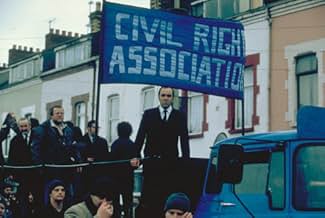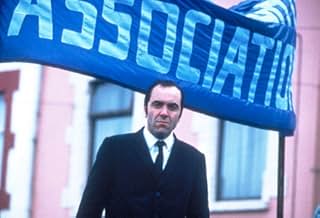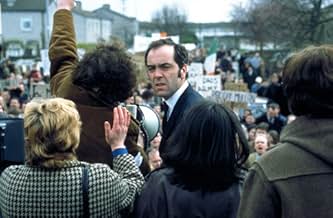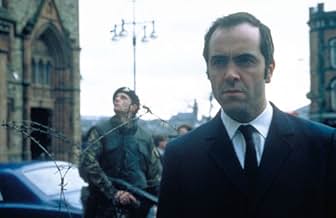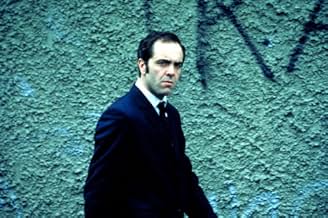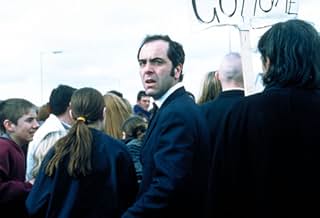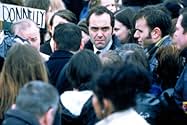A dramatization of the Irish civil rights protest march and subsequent massacre by British troops on January 30, 1972.A dramatization of the Irish civil rights protest march and subsequent massacre by British troops on January 30, 1972.A dramatization of the Irish civil rights protest march and subsequent massacre by British troops on January 30, 1972.
- Won 1 BAFTA Award
- 19 wins & 23 nominations total
Carmel McCallion
- Bridget Bond
- (as Carmel Mccallion)
Christopher Villiers
- Maj. Steele
- (as Chris Villiers)
- Director
- Writer
- All cast & crew
- Production, box office & more at IMDbPro
7.626.5K
1
2
3
4
5
6
7
8
9
10
Featured reviews
Documentary style drama recreating the events of 30th January1972 in Derry
Although initially difficult to get into, Bloody Sunday proved worthwhile persevering, as the latter half puts the viewer in the carnage.
The acting, especially James Nesbit is excellent, the recreation of the mood is superb although it was obvious with the constant close ups that there was very little budget to recreate the scenery. The geography was never explained and therefore would leave a viewer without prior knowledge of the area disorientated.
The documentary suffered from not being able to set the scene, a lot had happened in the week prior to the Civil Rights march that put both the participants and the security forces on edge and made the advance more significant. The question of why the Paras were sent to Derry were never fully explored.
Overall it was flawless recreation of events from the point of view taken by the film makers on this particular incident. It is worth noting that this is based on the Irish Governments review of the Widgery report into Bloody Sunday. (NB the Widgery report is mostly considered by nationalists to be a white wash)
The acting, especially James Nesbit is excellent, the recreation of the mood is superb although it was obvious with the constant close ups that there was very little budget to recreate the scenery. The geography was never explained and therefore would leave a viewer without prior knowledge of the area disorientated.
The documentary suffered from not being able to set the scene, a lot had happened in the week prior to the Civil Rights march that put both the participants and the security forces on edge and made the advance more significant. The question of why the Paras were sent to Derry were never fully explored.
Overall it was flawless recreation of events from the point of view taken by the film makers on this particular incident. It is worth noting that this is based on the Irish Governments review of the Widgery report into Bloody Sunday. (NB the Widgery report is mostly considered by nationalists to be a white wash)
for anyone even peripherally familiar with the northern conflict, this is an important film.
being from belfast, i have an all too familiar recollection of this and many other tragic events.
being born protestant, i have little use for the cowardly, yet brutal and malicious, mutation of the provisional ira; under the helm of gerry addams.
being born sentient, i have little use for the fire and brimstone polarisations; counterspin and half-truths of ian paisley.
being born human, i have empathy for the slain.
the bloody Sunday massacre in derry, was a tragic testament to man's blood-lust, fueled by fear and adrenaline. the events depicted in the movie "bloody Sunday," provide an arresting portrayal of a tacitly monumental aspect of modern ulster history. the portrayals of the people and the events maintain an objective testimony toward a tragedy that is both sobering and inexcusable.
"bloody Sunday" takes no sides, and distributes no blame. it simply reenacts the events as they were recorded, and lets the viewer make his or her own decisions.
if you are familiar with the conflict; if you are distressed by man's inhumanity unto himself; if you are simply interested in a detached account of history; this is an important film to see.
being born protestant, i have little use for the cowardly, yet brutal and malicious, mutation of the provisional ira; under the helm of gerry addams.
being born sentient, i have little use for the fire and brimstone polarisations; counterspin and half-truths of ian paisley.
being born human, i have empathy for the slain.
the bloody Sunday massacre in derry, was a tragic testament to man's blood-lust, fueled by fear and adrenaline. the events depicted in the movie "bloody Sunday," provide an arresting portrayal of a tacitly monumental aspect of modern ulster history. the portrayals of the people and the events maintain an objective testimony toward a tragedy that is both sobering and inexcusable.
"bloody Sunday" takes no sides, and distributes no blame. it simply reenacts the events as they were recorded, and lets the viewer make his or her own decisions.
if you are familiar with the conflict; if you are distressed by man's inhumanity unto himself; if you are simply interested in a detached account of history; this is an important film to see.
Like you were there
This is a film with a terrible nerve, from the press conferences in the Sunday morning, through the preparations for the march and the preparations of the military, and forward to the scenes in the hospital afterwards. The camera is working in a way, there you definitely can feel the gloomy weather and the excitement.
It's also a 1972 feeling about it, which doesn't feel acted, but like a documentary. James Nesbitt is making a tremendous job as the MP and when you notice that this man hasn't got an Oscar, the Oscar institution definitely seems like the stupid joke it is.
The only thing you can have against this Paul Greengrass' movie is the tendency in the end, where the relative documentary objectivity in the beginning, moves over to tendency. The unionists and the British government remain the totally bad guys and the catholics are the eternal martyrs. They might have been that this Sunday, but the conflict of Northern Ireland is a little more complicated.
However, this is definitely more exciting than most of what you see in the action genre.
It's also a 1972 feeling about it, which doesn't feel acted, but like a documentary. James Nesbitt is making a tremendous job as the MP and when you notice that this man hasn't got an Oscar, the Oscar institution definitely seems like the stupid joke it is.
The only thing you can have against this Paul Greengrass' movie is the tendency in the end, where the relative documentary objectivity in the beginning, moves over to tendency. The unionists and the British government remain the totally bad guys and the catholics are the eternal martyrs. They might have been that this Sunday, but the conflict of Northern Ireland is a little more complicated.
However, this is definitely more exciting than most of what you see in the action genre.
10mariobc
A very realistic portrayal of the events in Londonderry 1972.
I saw this film about 2 years ago, and was extremely impressed with the realism of the film.Having served with the British Army in Northern Ireland many years later I found the atmosphere and the general appearance and manner of the Paras extremely accurate, as I have seen many films about Ireland when trying to portray British soldiers they unfortunately could of done a little better. I consider myself to be open minded and understood and sympathized with the local catholic population during these events as this is or was pretty much how things are with regards to the catholic population in Northern Ireland.For me, the main good points were that the film was made in a documentary style in which the facts were shown in a straight to the point manner without any fancy computer effects or handsome faces portraying the main players. well done to the production team !!!!
I don't know much history but I know what I'll never forget.
I thought this was an amazing movie.
Now I learned about this in school for a while and as an Englishman I do feel a certain, oblique connection to the troubles. I didn't realise this kind of thing could happen among my compatriots (I'm not trying to belittle Irish Nationalism by calling the Northern Irish my compatriots, it's just how I have come to see them), and I hadn't realised I'd thought this way. It was a real consciousness raiser for me.
My biases notwithstanding, this movie is as a hypnotic account of a confusing episode of an even more confusing time. It has the task of representing the mindset of the times, the mindsets, I should say, while still making it into a spontaneous narrative.
I'm not an expert so I cannot vouch for the authenticity of any of this, but I feel I can believe all of it. There is a tendency for us to demarcate history from real life. A million deths is a statistic as Stalin said. But here I really feel history and the lives of regular people converge in a devastating way.
At its heart I suppose the movie is a mystery. Not so much who-done-it but a why-did-it. I really felt while I was watching, all the chaos and threat that leads to tragedy while still feeling baffled and disorientated throughout. It feels like a documentary. The dialogue is spontaneous but still rich with nuance. The cinematography is candid and even shaky, giving it an often hypnotic, Blair Witch quality.
A movie to never forget.
Now I learned about this in school for a while and as an Englishman I do feel a certain, oblique connection to the troubles. I didn't realise this kind of thing could happen among my compatriots (I'm not trying to belittle Irish Nationalism by calling the Northern Irish my compatriots, it's just how I have come to see them), and I hadn't realised I'd thought this way. It was a real consciousness raiser for me.
My biases notwithstanding, this movie is as a hypnotic account of a confusing episode of an even more confusing time. It has the task of representing the mindset of the times, the mindsets, I should say, while still making it into a spontaneous narrative.
I'm not an expert so I cannot vouch for the authenticity of any of this, but I feel I can believe all of it. There is a tendency for us to demarcate history from real life. A million deths is a statistic as Stalin said. But here I really feel history and the lives of regular people converge in a devastating way.
At its heart I suppose the movie is a mystery. Not so much who-done-it but a why-did-it. I really felt while I was watching, all the chaos and threat that leads to tragedy while still feeling baffled and disorientated throughout. It feels like a documentary. The dialogue is spontaneous but still rich with nuance. The cinematography is candid and even shaky, giving it an often hypnotic, Blair Witch quality.
A movie to never forget.
Did you know
- TriviaTo make this movie as authentic as possible, no lights were used in the movie and the camera work was entirely hand-held
- GoofsThe marchers carry homemade cardboard signs with slogans written on them. When shown from behind, some have modern printing ("Made in China") on them that are not appropriate for 1972.
- Quotes
Ivan Cooper: I just want to say this to the British Government... You know what you've just done, don't you? You've destroyed the civil rights movement, and you've given the IRA the biggest victory it will ever have. All over this city tonight, young men... boys will be joining the IRA, and you will reap a whirlwind.
- Crazy creditsThe live rendition of U2's Sunday, Bloody Sunday continues to play for a full three minutes over a black screen after the credits finish rolling.
- ConnectionsFeatured in The 2003 IFP Independent Spirit Awards (2003)
Details
Box office
- Budget
- £2,000,000 (estimated)
- Gross US & Canada
- $773,228
- Opening weekend US & Canada
- $29,419
- Oct 6, 2002
- Gross worldwide
- $1,758,689
- Runtime
- 1h 51m(111 min)
- Color
- Sound mix
- Aspect ratio
- 1.85 : 1
Contribute to this page
Suggest an edit or add missing content

